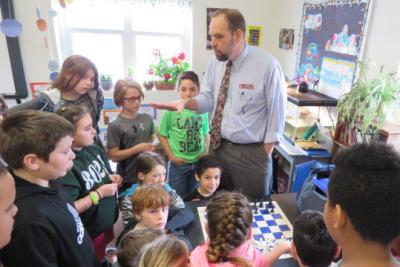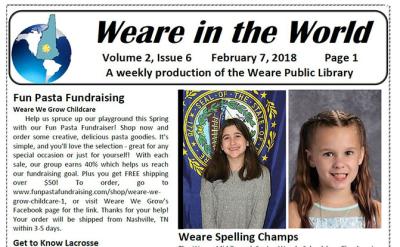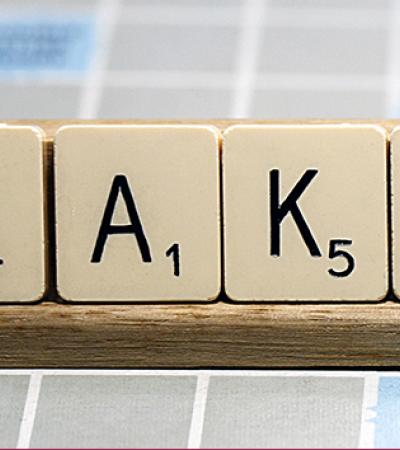Librarians have always been seen as great sources for information. So when the quarterly community newspaper of Weare, a small New Hampshire town 70 miles outside Boston, closed in 2016, the residents looked to Weare Public Library Director Mike Sullivan for a solution.
Not one to back down from a challenge, Sullivan put out his first four-page publication, full of community events and town news, in March 2017. And while he shrugs it off as nothing big, his little newspaper soon became a newsmaker, with national publications like The Atlantic and Poynter writing articles about the librarian-turned-journalist.
Programming Librarian talked to Sullivan to learn how this community lifeline came to be.

Programming Librarian: How did you come up with the idea for Weare in the World?
Mike Sullivan: Sort of out of necessity; our town newspaper closed, and no one else was really covering our town. At Community Coffee — an event we do once a month where the people of the town get together and have coffee and talk about issues — everybody was complaining about the lack of news. Somebody turned to me and said, "What are you gonna do about it?" Six days later we published the paper.
PL: Tell me about the logistics involved in actually making this physical newspaper.
MS: First we had to come up with a format that was cheap enough and easy enough to put out so consistently. We literally make it on a photocopier. Within two months we ran that photocopier, which was already old, into the ground and had to get a new one. Then it was largely about finding ways to gather information that goes into the paper.
PL: What sort of budget are you working with for this?
MS: It’s entirely within the budget of the library. We figured it costs about $25 an issue just for photocopying, because we print out between 200 and 240 copies per week. Then, of course, most of the cost is my time.
PL: In some of the articles previously written about Weare in the World, you say you have to work an extra eight hours a week to put the paper out. Do any other staff members contribute time?
MS: In the folding. We have to fold the paper here as well. But other than that, it all comes out of my desk.
PL: How does the paper get from the library to the customer?
MS: We’ve got about 10 spots around town, and I go out every Tuesday and deliver them. We drop off piles of them at a couple of town offices, retail places, coffee shops — just a few places that people may know to pick them up.
PL: How do you decide what to write about?
MS: The heart of the paper really is just a collection of upcoming events. We try to focus more on things that are going to happen so people can join in, rather than spending a lot of space talking about things that have already happened. We always have a feature or two and then one or two front-page stories with a nice picture of somebody happy and smiling.

PL: Looking through the paper, I saw multiple different bylines. Who are your writers?
MS: One of our really consistent writers this spring is my predecessor. Chris Hague used to be the director here, and she’s a longtime resident of the town, so she’s been going out and trying to get objective information on the things people vote on. I try to get stories from department heads, so you’ll see the police chief or the fire chief in there on occasion, and every now and then one of the selectmen will put in an article. We get something from nonprofits on occasion, and that’s always great.
PL: Since you’ve started working on the paper, how has your overall role at the library changed?
MS: I’m here more now. This is a small library — we have a staff of six, and I’m the only one that’s full-time — so we’re very used to doing everything in odd moments when we can, so that hasn’t really changed much. I do a little less of the programming that I used to do because this is a priority that people wanted, and we make that adjustment. But not much has changed overall. I do spend an awful lot of time mining people’s Facebook pages looking for things happening in town.
PL: I read that community events have been counting more people in attendance since the paper started. In what other ways has the community been affected by the newspaper?
MS: I think that there is a lot more awareness of what’s going on in town government. We’re a bedroom community, so people usually don’t know what’s happening in town government until it upsets them. The schools have been thrilled too, because there’s a huge gap between parents, who know exactly what’s happening in the schools, and everyone else in town who doesn’t have a clue. So the schools have really taken this as a chance to get out there and portray themselves as more of a community resource.
PL: Have you noticed a boost in activity at the library since the newspaper has gained so much attention?
MS: Yeah, people have come in and said they heard about us from New Hampshire Public Radio or The Atlantic. People have definitely been coming in with those magic words we love to hear in the library: "I’ve lived in this town for 27 years and I’ve never had a library card." The events that we do that are community-focused are getting stronger and stronger as well. Last year when we had our coffee meeting before the March election there were probably 12 people there. This year, just last week, there were 21.
PL: What do you see the paper evolving into in the future?
MS: I think the future is getting more and more people to contribute; I want to step back from as much of the writing as possible. I want people to feel like it’s their newspaper, not like it’s mine.
PL: Have you set any guidelines for when more people begin contributing?
MS: We haven’t printed it yet, but we’ve been building an editorial policy. I’m educating myself on what other outlets use so we have a sense of where our lines are and what we’re trying to do.
PL: What advice do you have for libraries who are considering starting their own newspaper?
MS: Keep it small, keep it flexible. We used to have a town newspaper, and it was a very good one. But it was so expensive and difficult to put together that it only came out once every three months, which really made news kind of a stretch, and they had to collect $5,000 in advertising just to put one issue out.
Libraries are really good at doing things on the cheap, doing things with marginal technology and producing something that’s more about the content than any of the other trappings. And you can do this cheap and quick and without a ton of expertise.
I’ve been in this business long enough that I really remember when librarians were constantly warned about mission creep and doing things that weren’t within the library’s mission, and I’ve been fighting against that for 15 years. Now I think it’s great that we can do something like this and get fairly little blowback. There’s still one or two people in town that say I should just stick to checking out books, but we’re not getting much of that reaction from the library world where we would have 15 years ago. The world’s changed and changed in a pretty good way.



